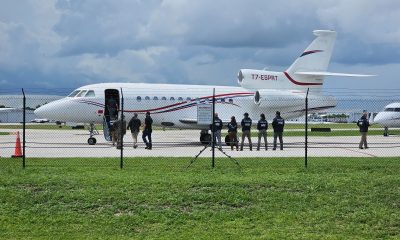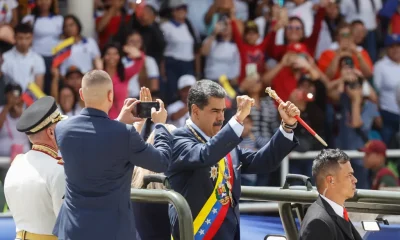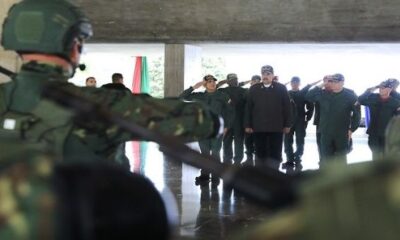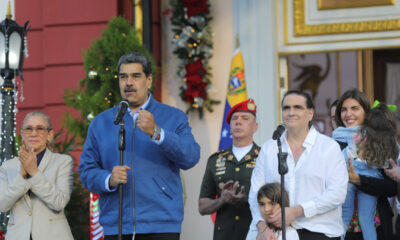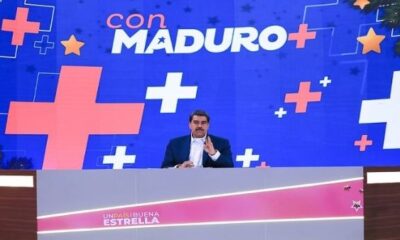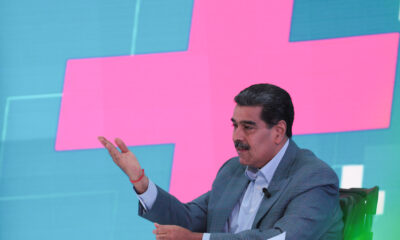International
Venezuelan President welcomes support from leaders calling for lifting of coercive measures
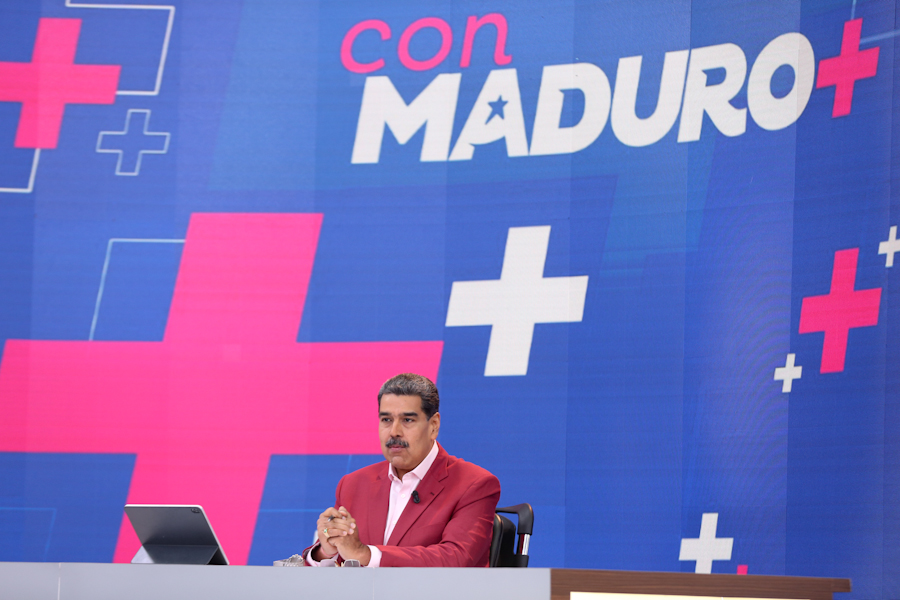
October 24 |
The president of Venezuela, Nicolás Maduro, thanked on Monday the support that Latin American and Caribbean leaders gave to the demands for the lifting of the unilateral coercive measures of the United States against his country, at the Palenque Meeting, in Mexico.
During his intervention in the television program Con Maduro Más, the dignitary highlighted that he shared with presidents and prime ministers and heads of delegation of 10 nations that met to dialogue on vital issues for the development of the nations involved.
“We are deeply grateful to the Government of Mexico, to the people of Mexico, for all the attentions, all the affection we have received in this summit of good neighborliness and for the well-being of our America”, he said.
In this sense, the dignitary assured that the Palenque Meeting was impregnated with the history of the ancestral Mayan culture, which invites us to think about the accumulated struggles and the current generations as a result.
“From all the cosmovision of these centuries of struggle, of life, of resistance, we are here. We are the result of those causes, of that life, of a whole grandiose history,” he said.
The Venezuelan president assured that the Palenque Meeting: For a fraternal neighborhood with well-being ratifies that the Venezuelan people are on the right side of history.
Nicolás Maduro refers to the agreements signed with the opposition in Barbados
The head of state specified that with the signing of the agreements with the opposition in Barbados, his government is once again betting on peace, respect and tolerance , following the postulates of the Venezuelan Constitution and laws.
“If it is necessary to sign with the devils for the peace and progress of Venezuela, we sign, in the name of God, the people and our homeland”, he stressed.
The President urged the opposition to enter the lane of respect and tolerance within the framework of the Constitution, and stop conspiring and asking for sanctions against the country.
He assured that the Barbados agreements are expected to have good results, and specified that, on the part of the Government, nothing will be done to damage it.
“This agreement allowed the activation of a set of agreements that have been discussed with the Government of the United States, as it is already known. A Return to the Homeland plan was then activated with two airplanes”, he said.
Maduro detailed that last Wednesday and Monday two planes arrived in Venezuela with nationals from the United States, who were mistreated in prisons of that country as if they were criminals or terrorists.
He denounced the networks of coyotes led by some members of the Venezuelan opposition, who incite people to emigrate to the U.S. and, when they arrive, they are imprisoned in subhuman conditions.
“Do not believe in false tales of the American dream. How many compatriots are enslaved abroad? The first Return to the Homeland flight urgently requested by the U.S. Government was activated”, he said.
He commented that in the context of the dialogues with the opposition in Barbados, the United States announced the beginning of a path that must be permanent and sustained that must lead to the total lifting of the unilateral coercive sanctions on Venezuela.
President Maduro welcomes the approval of the questions of the referendum on the Essequibo
The Venezuelan president also welcomed the questions to be included in the referendum on the Essequibo, after they were unanimously approved this Monday by the National Electoral Council (CNE).
Maduro emphasized that in the South American country, major issues of national interest are consulted to the people, and affirmed that Venezuela is the protagonist of true participative democracy.
Previously, in his social network account X, he had called Venezuelans to vote five times yes next December 3.
“We greet with great satisfaction the authorities of the National Electoral Council for the approval of the five questions that will be asked to Venezuelans in the Consultative Referendum in defense of Essequiba Guyana,” he wrote.
Head of State sends solidarity to the Palestinian people
Nicolás Maduro also sent his solidarity to the Palestinian people and called for a halt to Israel’s genocide against the population of Gaza.
Likewise, he insisted on the need to establish a world conference that would allow the establishment of a negotiation to return the rights to peace, territory, independence and a state of their own to the Palestinian people.
“From Venezuela we demand that, and we are going to achieve it with the peoples of the world”, he assured.
International
U.S. Senate Rejects Budget, Bringing Government Closer to Shutdown Amid DHS Dispute

The U.S. Senate voted on Thursday against a budget proposal in a move aimed at pressuring changes at the Department of Homeland Security (DHS), following the killing of two civilians during a deployment of immigration agents in Minneapolis.
All Senate Democrats and seven Republican lawmakers voted against the bill, which requires 60 votes to advance, pushing the country closer to a partial government shutdown that would cut funding for several agencies, including the Pentagon and the Department of Health.
The rejection came as Senate leaders and the White House continue negotiations on a separate funding package for DHS that would allow reforms to the agency. Proposed measures include banning Immigration and Customs Enforcement (ICE) agents from wearing face coverings and requiring them to use body-worn cameras during operations.
The vote took place just hours after President Donald Trump said he was “close” to reaching an agreement with Democrats and did not believe the federal government would face another shutdown, following last year’s record stoppage.
“I don’t think the Democrats want a shutdown either, so we’ll work in a bipartisan way to avoid it. Hopefully, there will be no government shutdown. We’re working on that right now,” Trump said during a Cabinet meeting at the White House.
International
Trump Says Putin Agreed to One-Week Halt in Attacks on Ukraine Amid Extreme Cold

U.S. President Donald Trump said on Thursday that he secured a commitment from Russian President Vladimir Putinto halt attacks against Ukraine for one week, citing extreme weather conditions affecting the region.
“Because of the extreme cold (…) I personally asked Putin not to attack Kyiv or other cities and towns for a week. And he agreed. He was very pleasant,” Trump said during a Cabinet meeting broadcast by the White House.
Trump acknowledged that several advisers had questioned the decision to make the call.
“A lot of people told me not to waste the call because they wouldn’t agree. And he accepted. And we’re very happy they did, because they don’t need missiles hitting their towns and cities,” the president said.
According to Trump, Ukrainian authorities reacted with surprise to the announcement but welcomed the possibility of a temporary ceasefire.
“It’s extraordinarily cold, record cold (…) They say they’ve never experienced cold like this,” he added.
Ukrainian President Volodymyr Zelensky later commented on the announcement, expressing hope that the agreement would be honored.
International
Storm Kristin Kills Five in Portugal, Leaves Nearly 500,000 Without Power

Storm Kristin, which battered Portugal with heavy rain and strong winds early Wednesday, has left at least five people dead, while nearly half a million residents remained without electricity as of Thursday, according to updated figures from authorities.
The revised death toll was confirmed to AFP by a spokesperson for the National Emergency and Civil Protection Authority (ANPEC). On Wednesday, the agency had reported four fatalities.
Meanwhile, E-Redes, the country’s electricity distribution network operator, said that around 450,000 customers were still without power, particularly in central Portugal.
Emergency services responded to approximately 1,500 incidents between midnight and 8:00 a.m. local time on Wednesday, as the storm caused widespread disruptions.
The Portuguese government described Kristin as an “extreme weather event” that inflicted significant damage across several regions of the country. At the height of the storm, as many as 850,000 households and institutions lost electricity during the early hours of Wednesday.
Several municipalities ordered the closure of schools, many of which remained shut on Thursday due to ongoing adverse conditions.
Ricardo Costa, regional deputy commander of the Leiria Fire Brigade, said residents continue to seek assistance as rainfall persists.
“Even though the rain is not extremely intense, it is causing extensive damage to homes,” he noted.
In Figueira da Foz, a coastal city in central Portugal, strong winds toppled a giant Ferris wheel, underscoring the severity of the storm.
-

 Central America5 days ago
Central America5 days agoGuatemala seizes over a ton of cocaine hidden in flour at Pacific port
-

 Central America3 days ago
Central America3 days agoGuatemala Police Arrest Prison Guard Caught in the Act of Extortion
-

 Central America3 days ago
Central America3 days agoHonduras swears in conservative president Asfura after disputed election
-

 International5 days ago
International5 days agoHistoric snowstorm paralyzes Toronto after 60 centimeters of snow
-

 Central America3 days ago
Central America3 days agoBukele leads public trust rankings as UCA survey highlights gains in security
-

 International2 days ago
International2 days agoFootball Fan Killed in Clashes After Colombian League Match
-

 International5 days ago
International5 days agoSpain’s irregular migrant population rises to 840,000, study finds
-

 Central America2 days ago
Central America2 days agoGuatemala President Says Starlink Terminal Found Inside Prison
-

 International3 days ago
International3 days agoDoomsday clock moves to 85 seconds before midnight amid rising global risks
-

 International3 days ago
International3 days agoWinter Storm Fern Leaves 30 Dead and Over One Million Without Power Across the U.S.
-

 Sin categoría3 days ago
Sin categoría3 days agoEight Killed in Series of Armed Attacks in Ecuador’s Manabí Province
-

 International3 days ago
International3 days agoSpain approves plan to regularize up to 500,000 migrants in Historic Shift
-

 International1 day ago
International1 day agoU.S. Senate Rejects Budget, Bringing Government Closer to Shutdown Amid DHS Dispute
-

 International5 days ago
International5 days agoRights group says nearly 6,000 killed in Iran protest crackdown
-

 Sin categoría3 days ago
Sin categoría3 days agoEl Salvador Launches Fourth Year of Ocean Mission to Protect Marine Ecosystems
-

 International2 days ago
International2 days agoRubio Says U.S. Could Participate in Follow-Up Russia-Ukraine Talks
-

 International2 days ago
International2 days agoMissing Spanish Sailor Rescued After 11 Days Adrift in Mediterranean
-

 Central America8 hours ago
Central America8 hours agoPanama Supreme Court Strikes Down Panama Ports Concession as Unconstitutional
-

 International5 days ago
International5 days agoVenezuela frees at least 80 political prisoners, NGO says
-

 International5 days ago
International5 days agoEU launches new probe into X over AI-generated fake nude images
-

 International1 day ago
International1 day agoStorm Kristin Kills Five in Portugal, Leaves Nearly 500,000 Without Power
-

 Central America8 hours ago
Central America8 hours agoU.S. and Guatemala Sign Trade Deal Granting Zero Tariffs to Most Exports
-

 International1 day ago
International1 day agoTrump Says Putin Agreed to One-Week Halt in Attacks on Ukraine Amid Extreme Cold
-

 International1 day ago
International1 day agoMan Arrested After Vehicle Crashes Into Jewish Institution in Brooklyn
-

 International5 days ago
International5 days agoFrance debates ban on social media for children under 15
-

 International5 days ago
International5 days agoSevere winter storm grips U.S., leaves multiple dead as extreme cold persists

























